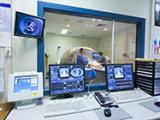Multidisciplinary/Multimodality Management of Locally Recurrent Rectal Cancer - SPOC

Jose Gaston Guillem, MD, MPH, MBA, will describe how at UNC Medical Center a team of experts carefully reviews each individual patient during a Weekly GI Tumor Board and collaboratively develop a treatment plan which defines the specific timing and sequence of care for each patient.
Category
- Research to Practice
Format
- Non-Credit Course
Credits
- 1.00 Participation
Closing the Chasm Between Native Community Priorities in Cancer Prevention and Healthcare Research Priorities - SPOC

Cancer touches all of our lives. For many Native communities, fears of cancer risk from environmental sources beyond their control are common. Some researchers, usually unaware of Native community concerns, can harbor the perspective that Native communities could be fruitful populations for studying the genetic risks of cancer. This webinar will help both sides of this chasm understand the other's point of view, hopefully leading to more effective communications and priority setting.
Category
- Advanced Practice Provider
Format
- Non-Credit Course
Credits
- 1.00 Participation
American Indian Cancer Control and Health Equity - SPOC

Donald Warne, MD, MPH, will describe health disparities and inequities related to American Indian cancer control. We will explore the legal basis for federally-funded health services to American Indians and the complexity of health policy at the federal, state and tribal levels that impact cancer control. We will provide a framework for health equity and a path forward to improve outcomes.
Category
- Southeastern American Indian Cancer Health Equity Partnership
Format
- Non-Credit Course
Credits
- 1.00 Participation
Right Image for the Right Patient: A Guide to Ordering Abdominal Radiological Studies - SPOC

Lauren M.B. Burke, MD, and Katrina A. McGinty, MD, provide an overview of different imaging modalities for imaging the abdomen, as well as some of their common indications and patient-specific limitations. They will also discuss an overview of commonly used imaging modalities with an emphasis on understanding different modalities' strengths and limitations. The goal is to provide instruction on deciding when different imaging modalities and tests are appropriate for different pathologies.
Category
- Advanced Practice Provider
Format
- Non-Credit Course
Credits
- 1.00 NCPD/CNE
- 1.00 Participation
Acute Radiation Side Effects - SPOC

Lara Novak, PA-C, will provide an overview of acute radiation side effects from head to toe.
Category
- Advanced Practice Provider
Format
- Non-Credit Course
Credits
- 1.00 Participation
An Introduction to Cancer Registry Operations - SPOC

Isiah Zipple, CTR provides a detailed explanation of key cancer registry functions and highlight the data it contains.
Category
- Patient Centered Care
Format
- Non-Credit Course
Credits
- 1.00 Participation
Advanced Technologies in Radiation Oncology: Impact on our Day-to-Day Practice - SPOC

Arthur Blackstock, Jr., MD, will discuss protons entering the state, the expanded use of Stereotactic Body Radiation Therapy (SBRT), and perhaps review the impact of PSMA imaging in Radiation Oncology.
Category
- Research to Practice
Format
- Non-Credit Course
Credits
- 1.00 Participation
Psycho-Social Complications of Receiving a Cancer Diagnosis and Treatment During the Pandemic - SPOC

This presentation focuses on the unique psychosocial complications related to being diagnosed with - and treated for - cancer during the COVID pandemic.
Category
- Patient Centered Care
Format
- Non-Credit Course
Credits
- 1.00 Participation
What Can VIR Do for You? - SPOC

Katie Riffle, MSN, FNP-BC, provides a quick glimpse into what procedures Vascular Interventional Radiology (VIR) offers, reasons behind clinical decisions and how to manage patients after. She will also discuss ways to trouble shoot CVADs, drains, and feeding tubes.
Category
- Advanced Practice Provider
Format
- Non-Credit Course
Credits
- 1.00 Participation
Ostomies and Enteral Tubes - SPOC

Ostomies, tubes, and drains are often necessary in the adult oncology population for various reasons and clinical scenarios. This presentation serves as an overview of the different types of ostomies, as well as frequently used tubes and drains, such that APPs across all oncology disciplines will be familiar with their necessity, use, and common complications.
Category
- Advanced Practice Provider
Format
- Non-Credit Course
Credits
- 1.00 Participation

 Facebook
Facebook Twitter
Twitter LinkedIn
LinkedIn Forward
Forward